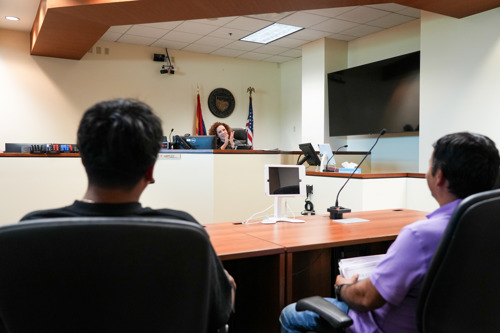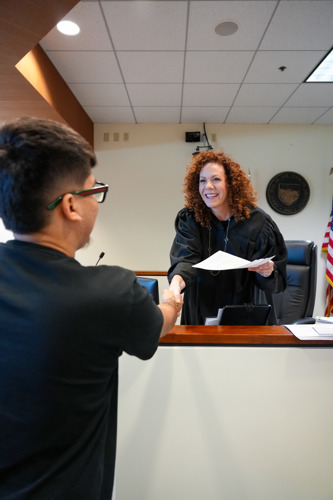My Record and My Rights Event Destroys 19 Juvenile Records
Clara Colmenero | September 19th, 2024
PressThe Durango Juvenile Court Center opened its doors on a Saturday morning to assist individuals with a juvenile delinquency or diversion record in having their records destroyed, giving them an opportunity for a fresh start.
A juvenile record can present obstacles to obtaining employment, joining the military and even renting an apartment. For individuals involved in the justice system, clearing a juvenile record can be a crucial step toward achieving success.
“Project Restore provides an opportunity for those who were involved in the juvenile justice system an expeditious format to move forward without the stigma of a juvenile record,” said Lori Horn Bustamante, the Presiding Judge of the Juvenile Department. “We want those who made mistakes as a youth to be able to pursue their dreams without their past holding them back.”

The event aimed to destroy juvenile records, restore civil rights, set aside a juvenile adjudication, or obtain an expungement of marijuana offenses. Judicial Branch judges were on-site at this year’s event to issue immediate rulings.
“The focus of Juvenile Court is rehabilitation. Project Restore offers hope to those currently involved in Juvenile Court that they will not have to live with their juvenile record forever,” said Caitlin Engstrand, delinquency attorney supervisor for the Maricopa County Office of the Public Advocate. “And for those who have demonstrated rehabilitation, an opportunity to restore their rights in a quick and convenient way to set them on a new (better) path.”
This year’s Project Restore event saw 24 attendees who filed 38 applications for record destruction, restoration of rights, set aside adjudication or expungement of marijuana charges. Of the 38 applications submitted, 19 were granted.

Partners for the event, in addition to the Judicial Branch (Superior Court and the Maricopa County Juvenile Probation Department), include the Maricopa County Attorney’s Office, the Maricopa County Office of the Public Advocate, Community Legal Services, the Maricopa County Clerk of the Superior Court and Arizona State University’s Youth Justice Lab. The 2nd annual Project Restore event took place on Sept. 7.
“Many people think that a juvenile record doesn’t matter or will automatically be sealed after they’ve served their time or completed their requirements. But that’s often not true. It can drag people down—people who have already made their amends and paid their debts to society,” said Adam Fine, professor and head of the Youth Justice Lab in the School of Criminology and Criminal Justice at Arizona State University. “This is about making the process clear, simple, and accessible so that we can give them the chance to leave their past behind and start a new life.”
One of the event’s partners, ASU’s Youth Justice Lab, created a valuable guide and assessment tool to help individuals determine their eligibility for juvenile record destruction.
Anyone who was not able to attend the event may still access ASU Youth Justice Lab’s guide and assessment tool